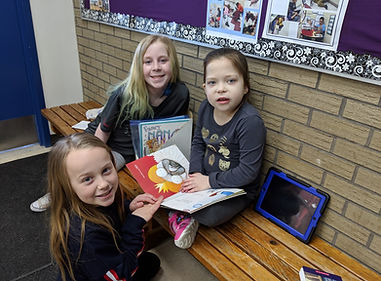The Literacy Barrier
Context
When I started at Glendale there were no district literacy coaches and there was no cohesive Glendale approach to school-wide literacy.
We had begun F&P benchmarking but staff training hadn’t reached everyone yet. Students at Glendale were struggling with literacy. With a mix of elementary and middle school students and a significant number of EAL students, we embraced both the challenges and opportunities of building a literacy program.



Literacy Specialist
My Role

I was the Grade 7 and 8 Language Arts (English) teacher for three years, during which I focused on building staff capacity and nurturing a culture of literacy by establishing a literacy committee, sourcing phonics programs, and organizing professional development for staff. From 2015-2018 I was able to pilot some literacy interventions in our school. All of this work towards schoolwide literacy was in additiona to my full time teaching load until Sept 2018 when our school was offered one-year funding (CIF) to hire a literacy specialist and I was given this opportunity. With a full time commitment to literacy programming, and a team of 4 literacy coaches to collaborate with in our district, the sky was the limit…
Glendale’s Literacy journey began in earnest in September 2018 with a clear mission: to help students discover a love of reading, identify and fill gaps in reading instruction, and cultivate a school-wide culture of literacy. We were determined to help our kids learn to read.
Defining the Problem
Where Are We Coming From?
The process started with a review of previous literacy efforts. Implementation formally began in the June–August period of 2018, focusing on "Getting Ready".
This phase included substantial staff input, as they were asked for and provided a list of specific needs, such as:
-
An agreed-upon sight word list and a school-wide plan for writing forms and grammar rules.
-
A unified language for literacy instruction (e.g., using "chunking" rather than "chunky monkey").
-
Ideas on how to use the literacy block.
-
School-wide benchmark standards.

Gathering Info





The Process
Research
This period of collaboration also involved reviewing extensive research, including works by Dr. Janet Nadine, Miriam Trehearne, and Lucy Calkins, and investigating training opportunities for programs like Leveled Literacy Intervention (LLI), DIBELS, and Precision Reading. The staff survey and brainstorming directly informed the essential goals, resources, and organization of the literacy plan.
Iterations
Different “rounds” of literacy intervention followed. After each one, students’ reading was assessed, parent, student, and staff feedback was collected, data was shared, and staff had a voice in the next round.

Addressing Staff Concerns
A key challenge in the design and implementation process was managing staff concerns, particularly regarding the structure of the intervention blocks. Historically, an initial attempt at using Mixed Grade Literacy Block Groups faced resistance because teachers did not like that they were not working with their “own kids”. There was an implicit request for staff to take on a collective responsibility for reading, recognizing that the literacy block provided extra time for intervention and required additional accountability. We needed to move towards a philosophy of they’re all “our kids” to utilize resources more effectively in small mixed groups.

Key Challenges

The Emotional Side of Change
Changing instructional methods was difficult. Implying a devaluation of what teachers have been doing results in hurt feelings. This resistance lead to difficult conversations and staff needed support through this.
The literacy program implementation used different iterations of the literacy block to address these concerns while providing targeted intervention:
In October and November, the school launched its highly structured intervention period, utilizing Mixed Grade Literacy Block Groups (Mixed Division Groups) for six to nine weeks. During this time, large groups of at-level students focused on reading independently, freeing up teachers and Education Assistants (EAs) to work with small groups for intensive daily interventions like Guided Reading (GR) and Leveled Literacy Intervention (LLI). This period also included the kick-off of the school-wide reading celebration, #Glendalereads, which tracked books read and culminated in festive assemblies and Book Fairs. Phonics work in Division 1 during this period proved to be extremely effective for early intervention.
By January, the literacy blocks transitioned back to the regular classroom setting, with teacher and EA teams managing intervention groups while other students engaged in silent reading and literacy centers.
Navigating Iterations
Allocation of Resources
There are never enough staff or resources to support every student in the way we’d like to support them. To combat this, we focused on every student getting what they needed for a time, and used a Pyramid of Support model to determine which groups would get which supports. Students at Glendale designated for Tier 2 and Tier 3 support participated in daily Reading Intervention. To help teachers feel optimistic instead of weighed down with this reality, we celebrated successes, no matter how small. We applied for grants to buy more books. I met with students in the mornings and after school to provide more support.




Innovative Solutions
Professional Development
Throughout the year, professional development focused on refining a balanced literacy approach, unifying staff language, and utilizing assessments like Benchmark results to tailor teaching strategies. Staff also worked to build literacy culture through weekly cross-grade Reading Buddies, publishing clubs, and encouraging parents to support reading at home.
Access to Quality Books
Our library was outdated and not a space that staff and students utilized. I began a legacy project with our grade 8 class to upgrade the space. This included fundraising, applying for grants and working with Facility Services to prioritize upgrades. Students helped sort and rearrange books, paint furniture and fundraised. We ended up with approximately 50,000 in donations, upgrades, board games, and new books. Our Learning Commons became central to our school’s culture of literacy. The space became a hub in the school for activities, clubs, and library periods. Book circulation increased by just under 30%.
Reading Growth



Measuring Impact

By the end of the 2018-2019 school year in June, final reading assessments were completed for all students. The extensive effort showed significant improvement: the percentage of students reading within one year of their grade level had increased to 81.4%, rising from 73.8% in June 2018. Students at Glendale demonstrated tangible achievements in their literacy capabilities. The success solidified the commitment to literacy, leading to plans for continued improvement in the subsequent school year.
The pie chart shows June 2018 Reading Scores.


What Did We Accomplish?
The litearcy specialist position was given funding fro .5 FTE in 2019 and was not funded past that. Our success helped inform many schools' approaches to literacy planning. Time and resources went into finding a district-wide phonics program and within four years, all elementary and middle schools had prioritized a literacy block in their timetabling.
Kids who had not been readers, became readers. All students moved forward in their literacy journey, and based on anecdotal evidence, staff believed in our vision for a literacy-rich school culture and felt the difference.
Appreciation
Thanks to Katie B. - for working with the many stakeholders (Staff, Admin, Sr. Admin, Facility Services, Suppliers, etc...) A project manager wears many hats and keeps all the balls in the air during their juggling performance. You nailed it and we are a better school because of it.
Cy lucked out with you, since she also loves art & reading, and learning... and middle school is just something we all have to get through. Having great teachers makes all the difference!
Thank you mrs bruinsma for being such a good teacher. You always help me when i'm stuck and when i don't know what to do. You are one of my favorite teachers and you are always kind.
Thank you for reading with me in the mornings. It's starting to be easier for me.
(Although admin has always been appreciative of your skills/effort) I just wanted to take a minute to share how thankful and appreciative I was to observe a little of your before-school instruction/mentoring that you were giving Gr. 8 Wyatt for literacy.
When I asked Amy M. (who was setting up in your room) how often you met with Wyatt, she said "every day".
I was not aware of this extra commitment so THANK YOU!
I love that kid, and I love the opportunities that you are giving him!


Thank you ms bruinsma for all the good lessons and helping me out when my grandma was sick. It was really thoughtful of you to even check up on me and i never would’ve expected you bringing in A&W for me. Thank you so much for being a good teacher!


Wow! I have never seen p/t interviews done so well. Just want to let you know that I'm so inspired by the success of the engagement, value & information to families, and ownership & pride in student learning that was evident tonight. It must have been a lot of work at such a very busy time of the year. You guys must feel great to have pulled off such a homerun of an interview. It was first class work!
For all the work you've done for me and my friends on the basketball team you've helped me improve my layup and my shot and those are really big things in basketball I'm looking forward To the upcoming season and hopefully you'll put me as point guard
Thank you Mrs.Brusma for helping me through grade seven and eight, even when I wasn’t the most polite at time you were still there.
Many people have written me nice things, but this is one of the nicest messages I have received. I'm so pleased you got the opportunity you deserve to make a great contribution to kids.
Take care and I'm sure our paths will cross again.

